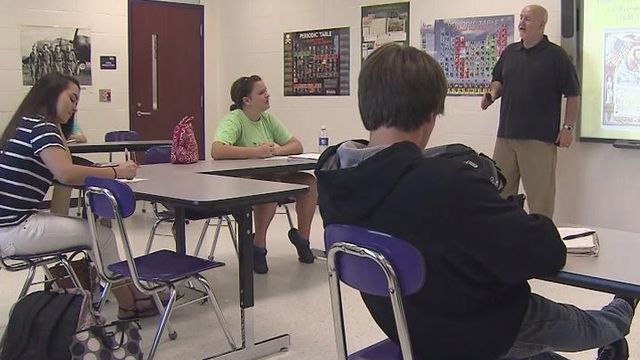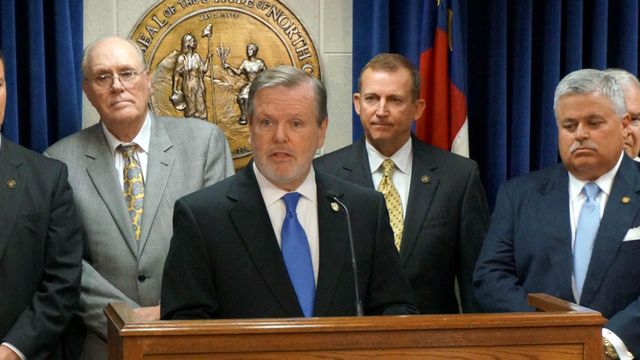Senate budget ties teacher raises to dropping tenure rights
Senate leaders used a news conference Wednesday morning to tout what they said would be the most significant pay raise for teachers in North Carolina history, but they did not provide the details of how they would pay for the plan without a tax increase.
The average salary increase would be $5,809 for teachers, depending on their seniority.
"This is a significant step in addressing what has been a problem in North Carolina," said Senate President Pro Tem Phil Berger.
Low teacher salaries have been a cause for concern across the state, prompting stories about longtime educators moving to other states or changing jobs because of their stagnant pay. The Senate plan, Berger said, would vault North Carolina to "the middle of the pack" in teacher pay nationally and make it third in the Southeast, trailing only Georgia and Louisiana.
The $468 million teacher pay plan is part of the $21 billion budget lawmakers are crafting, and it builds on a proposal floated by Gov. Pat McCrory earlier this year. Senate Republicans revealed only the K-12 education pieces related to teacher pay Wednesday. The rest of the budget is due to be posted online late Wednesday night. After the Senate passes its budget, House leaders will take a stab at crafting a spending plan.
"The details will be there," said Berger, R-Rockingham, emphasizing that no budget plan would raise taxes. That leaves lawmakers drawing from reserves and making cuts to other parts of the budget in order to pay for the teacher raises.
"There's lots of places we're looking at," Appropriations Committee Chairman Harry Brown, R-Onslow, said after the news conference. Asked specifically where the money might come from, he said, "We're trying to pull it all together now."
The most likely places from which to draw money would be the University of North Carolina system budget and the state Health and Human Services budget, specifically the costly Medicaid program for the poor and uninsured. Lawmakers could also draw from other ares of the K-12 budget, for example, by cutting back on the number of teaching assistants in early grades.
"If we got off on that tangent, you think this message would get out," said Sen. Jerry Tillman, R-Randolph, explaining why budget writers were not revealing other details of the spending plan. "Just believe it, and you'll see it."
Some teachers could keep tenure
"Our hardworking teachers simply deserve a competitive salary and the ability to make ends meet," Senate Minority Leader Dan Blue said in a statement.
Blue, D-Wake, said the impulse to raise teacher pay was a good one, but he raised questions about where the money might come from.
"It remains to be seen how Senator Berger plans to pay for these raises without dismantling other essential services, given his massive handouts to the wealthy and special interests last year," he said.
Berger repeatedly emphasized what he viewed as the key features of the plan, mostly the size of the potential raises.
Asked about whether the pay plan would fund fewer teachers, he said, "there may be fewer teachers because we have fewer students." He said the average class size wouldn't increase.
In general, the plan appears to increase teacher pay more rapidly than the current plan, starting teachers with a salary around $32,000 during the first three years and increasing to $50,000 by year 20. After that, the salary schedule plateaus for several years before increasing again in year 30.
The Senate's education plan repeals a controversial provision in last year's budget that forced school districts to offer pay raises to 25 percent of their teachers in exchange for those teacher giving up career status, what many call tenure. That law is the subject of two different lawsuits, and two judges have already ruled that it is likely unconstitutional.
Under the new proposal, teachers would be able to keep their tenure rights but would not receive any pay bump. Instead, they would be left at their current salaries with no prospect of a raise.
Mark Jewell, vice president of the N.C. Association of Educators, called the tenure trade off "unwarranted," saying teachers should not be asked to give up career protections for more money.
"If there's enough money to give teachers a pay raise, we need to give teachers a pay raise," he said.
The Senate plan also:
- extends supplemental pay for teachers with master’s degrees to those who have completed at least one course in a graduate program as of July 1, 2013.
- expands opportunities for local school systems to reward top teachers by allocating funds for up to 35 percent of teachers to receive pay-for-excellence increases.
- provides for a $1,000 pay increase for those who work directly for the State Board of Education.
- provides funds for pay raises for school administrators.











